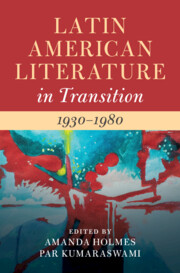Book contents
- Latin American Literature in Transition 1930–1980
- Latin American Literature in Transition
- Latin American Literature in Transition 1930–1980
- Copyright page
- Contents
- Contributors
- Introduction
- Part I War, Revolution, Dictatorship
- Part II Metropolis and Ruins
- Part III Solidarity
- Chapter 9 “Dar Testimonio” as a Lens for Rethinking the Mexican Literary Canon
- Chapter 10 Landscapes of Heterogeneity in a Mid-Twentieth-Century Quechua Poem
- Chapter 11 Beyond the Nation Frame
- Chapter 12 Femininity in Flux
- Chapter 13 The Representation of Afro-Cuban Orality by Fernando Ortiz, Lydia Cabrera, and Nicolás Guillén
- Part IV Aesthetics and Innovation
- Index
- References
Chapter 9 - “Dar Testimonio” as a Lens for Rethinking the Mexican Literary Canon
from Part III - Solidarity
Published online by Cambridge University Press: 24 January 2023
- Latin American Literature in Transition 1930–1980
- Latin American Literature in Transition
- Latin American Literature in Transition 1930–1980
- Copyright page
- Contents
- Contributors
- Introduction
- Part I War, Revolution, Dictatorship
- Part II Metropolis and Ruins
- Part III Solidarity
- Chapter 9 “Dar Testimonio” as a Lens for Rethinking the Mexican Literary Canon
- Chapter 10 Landscapes of Heterogeneity in a Mid-Twentieth-Century Quechua Poem
- Chapter 11 Beyond the Nation Frame
- Chapter 12 Femininity in Flux
- Chapter 13 The Representation of Afro-Cuban Orality by Fernando Ortiz, Lydia Cabrera, and Nicolás Guillén
- Part IV Aesthetics and Innovation
- Index
- References
Summary
This chapter reconsiders midcentury Mexican literary history through the lens of the concept of bearing witness (“dar testimonio”). Taking speeches by Rosario Castellanos and Miguel Angel Asturias as its starting point, the chapter argues that the idea of bearing witness and expressing solidarity with marginalized groups shaped Latin American and specifically Mexican literature in the period 1930-80. Looking again at the Mexican canon in this period from this fresh perspective, an overlooked tradition of women authors emerges. These women write out of solidarity with and to bear witness to the experiences and sufferings of less privileged others. Women authors are often grouped together on the basis of their gender. Yet, this chapter identifies alternative connections between better-known Mexican women authors such as Elena Poniatowska, Nellie Campobello, and Rosario Castellanos and others who are less often the focus of critical attention, including Benita Galeana, Carlota O’Neill, Ascensión Hernández de León-Portilla, and Elvira Vargas. Focusing on the act of bearing witness brings to the fore the contributions of women authors and the connections between them, as well as encouraging us to consider alternative ways of writing literary history based on new categories and periodizations.
Keywords
- Type
- Chapter
- Information
- Latin American Literature in Transition 1930–1980 , pp. 149 - 163Publisher: Cambridge University PressPrint publication year: 2022



